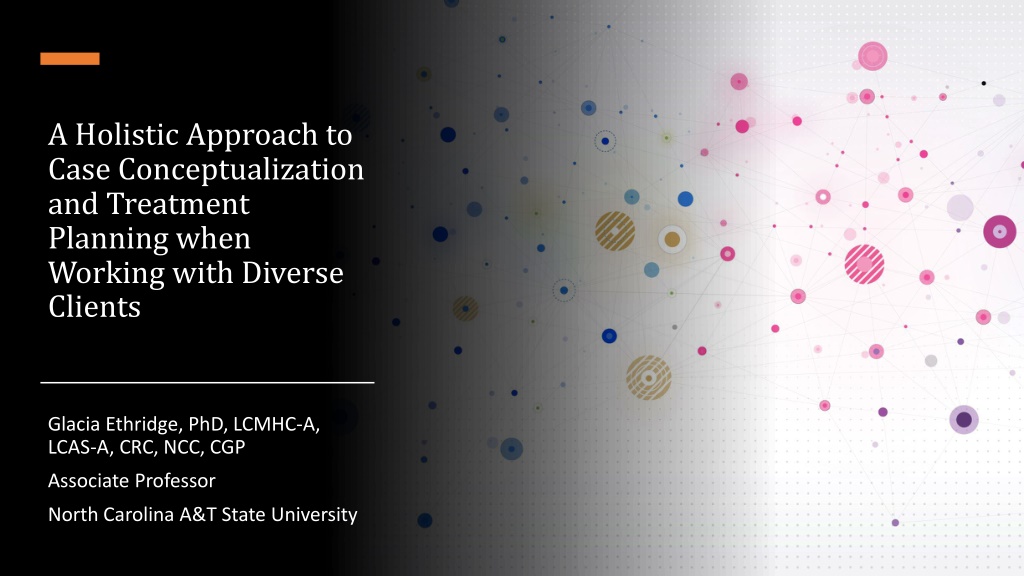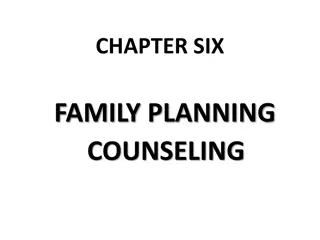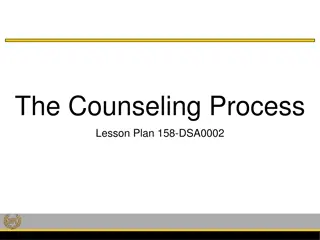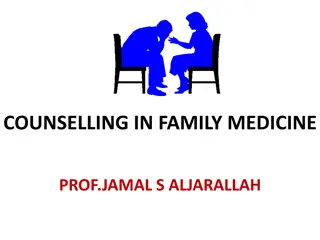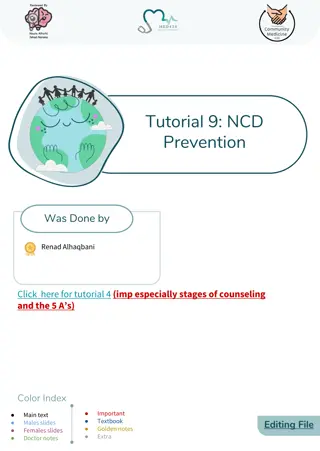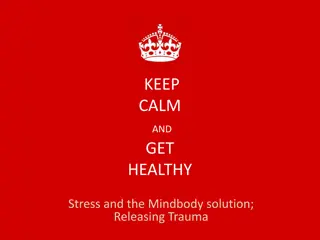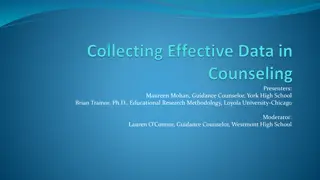Understanding Culture in Counseling: A Holistic Approach
Explore the importance of considering culture in counseling, examining ethical codes, therapeutic alliances, and case conceptualization. Learn how cultural competence enhances client care in diverse settings.
Download Presentation

Please find below an Image/Link to download the presentation.
The content on the website is provided AS IS for your information and personal use only. It may not be sold, licensed, or shared on other websites without obtaining consent from the author. Download presentation by click this link. If you encounter any issues during the download, it is possible that the publisher has removed the file from their server.
E N D
Presentation Transcript
A Holistic Approach to Case Conceptualization and Treatment Planning when Working with Diverse Clients Glacia Ethridge, PhD, LCMHC-A, LCAS-A, CRC, NCC, CGP Associate Professor North Carolina A&T State University
About Me About Me Higher Education Experience Clinical Experience Teaching Psychopathology Course Professional Orientation and Ethics Career and Employer Development Multicultural Counseling State Vocational Rehabilitation Counseling Case Services Coordinator Vocational Evaluator Private Practice
Presentation Presentation Purpose Purpose
Presentation Overview Presentation Overview Identify relevant ethical codes associated with culture Explore the role of the therapeutic alliance Define and explore aspects of culture Discuss aspects of case conceptualization and treatment planning Operationally define case conceptualization and treatment planning Engage in experientially- learning based activities
Why it important to consider culture when working clients?
Culture Culture All graduate programs have at least one course on diversity. Additionally, when pursuing a certification and licensure in the state of North Carolina, diversity is a course that must have been taken and successfully passed. American Counseling Association (ACA) Code of Ethics Commission on Rehabilitation Counselor Certification (CRCC) Code of Ethics
American Counseling Association (ACA) American Counseling Association (ACA) Culture: membership in a socially constructed way of living, which incorporates collective values, beliefs, norms, boundaries, and lifestyles that are cocreated with others who share similar worldviews comprising biological, psychosocial, historical, psychological, and other factors. Diversity: the similarities and differences that occur within and across cultures, and the intersection of cultural and social identities Multicultural/Diversity Competence: counselors cultural and diversity awareness and knowledge about self and others, and how this awareness and knowledge are applied effectively in practice with clients and client groups. Multicultural/Diversity Counseling: counseling that recognizes diversity and embraces approaches that support the worth, dignity, potential, and uniqueness of individuals within their historical, cultural, economic, political, and psychosocial contexts. Social Justice: the promotion of equity for all people and groups for the purpose of ending oppression and injustice affecting clients, students, counselors, families, communities, schools, workplaces, governments, and other social and institutional systems.
Relevant ACA Ethical Codes Relevant ACA Ethical Codes Section A The Counseling Relationship A.10.f. Receiving Gifts Counselors understand the challenges of accepting gifts from clients and recognize that in some cultures, small gifts are a token of respect and gratitude. When determining whether to accept a gift from clients, counselors take into account the therapeutic relationship, the monetary value of the gift, the client s motivation for giving the gift, and the counselor s motivation for wanting to accept or decline the gift. Section C Professional Responsibility C.5. Nondiscrimination Counselors do not condone or engage in discrimination against prospective or current clients, students, employees, supervisees, or research participants based on age, culture, disability, ethnicity, race, religion/spirituality, gender, gender identity, sexual orientation, marital/ partnership status, language preference, socioeconomic status, immigration status, or any basis proscribed by law.
Relevant ACA Ethical Codes Continued Relevant ACA Ethical Codes Continued Section E Evaluation, Assessment, and Interpretation E.5.b. Cultural Sensitivity Counselors recognize that culture affects the manner in which clients problems are defined and experienced. Clients socioeconomic and cultural experiences are considered when diagnosing mental disorders. E.8. Multicultural Issues/ Diversity in Assessment Counselors select and use with caution assessment techniques normed on populations other than that of the client. Counselors recognize the effects of age, color, culture, disability, ethnic group, gender, race, language preference, religion, spirituality, sexual orientation, and socioeconomic status on test administration and interpretation, and they place test results in proper perspective with other relevant factors.
Commission on Rehabilitation Counselor Commission on Rehabilitation Counselor Certification (CRCC) Certification (CRCC) CULTURAL COMPETENCE: possessing a set of values and principles and demonstrating behavior, attitude, knowledge, or skills that enable one to work effectively cross-culturally with the capacity to value diversity, conduct self-assessment, manage the dynamics of difference, acquire and institutionalize cultural knowledge, and adapt to diversity and the cultural contexts of the individuals and communities served. CULTURALLY DIVERSE: the existence of a variety of cultural or ethnic groups within a society. CULTURAL HUMILITY: a lifelong process of self- reflection and self-critique whereby the individual not only learns about another's culture but starts with an examination of their own beliefs and cultural identities.
Commission on Rehabilitation Counselor Commission on Rehabilitation Counselor Certification (CRCC) Continued Certification (CRCC) Continued MULTICULTURAL: relating to or constituting several cultural and/or ethnic groups within a society. MULTICULTURALISM: practice of giving attention to many different cultural backgrounds and identities in society based on characteristics such as age, race, ethnicity, disability status, gender and gender identify/expression, sexual identity, sexual orientation, etc. SOCIAL JUSTICE: the view that everyone deserves equality of opportunity in relationship to economic, political, and social rights, and equality of access to housing, healthcare, employment, and more.
Commission on Rehabilitation Counselor Commission on Rehabilitation Counselor Certification (CRCC) Certification (CRCC) Values and Principals: respecting and understanding the diversity of human experience and appreciating culture. Commitment To Cultural Diversity: CRCs/CCRCs are committed to providing respectful and timely communication, taking appropriate action when diversity issues occur, and being accountable for the outcomes as they affect people of all races, ethnicities, genders, national origins, religions, sexual orientations, and other cultural group identities.
Relevant CRCC Ethical Codes Relevant CRCC Ethical Codes SECTION A: THE COUNSELING RELATIONSHIP c. EMPLOYMENT. When assessing potential employment goals, CRCs/CCRCs consider the client's overall abilities. Assessment of potential employment includes consideration of the client's functional capabilities, interests and aptitudes, social skills, education, general qualifications, transferable skills, work history, psychological characteristics, geographic locations, and other relevant characteristics and needs of clients. CRCs/CCRCs facilitate the placement of clients in positions consistent with their interests, education/skills, culture, and welfare. d. AVOCATIONAL AND INDEPENDENT LIVING GOALS. CRCs/CCRCs work with clients to develop avocational, independent living, and community integration goals consistent with their abilities, interests, culture, needs, and welfare.
Relevant CRCC Ethical Codes Continued Relevant CRCC Ethical Codes Continued A.2. RESPECTING DIVERSITY a. RESPECTING CULTURE. CRCs/CCRCs demonstrate cultural humility and respect for the cultural identity of clients in developing and implementing culturally responsive rehabilitation strategies and treatment plans by providing and adapting interventions. b. NONDISCRIMINATION. CRCs/CCRCs do not condone or engage in the prejudicial treatment of an individual or group based on their actual or perceived membership in a particular group, class, or category.
Relevant CRCC Ethical Codes Continued Relevant CRCC Ethical Codes Continued A.4. PROHIBITED ROLES AND RELATIONSHIPS WITH CLIENTS j. ACCEPTING GIFTS. CRCs/CCRCs shall not accept gifts from clients except in cases when it is culturally appropriate or therapeutically relevant. CRCs/CCRCs understand the challenges of accepting gifts from clients and recognize that in some cultures, small gifts are a token of respect and gratitude. When determining whether to accept gifts from clients, CRCs/CCRCs take into account the cultural or community practice, therapeutic relationship, the monetary value of the gift(s), the client s motivation for giving the gift(s), and the motivation of the CRCs/CCRCs for accepting or declining the gift(s). CRCs/CCRCs are aware of and comply with their employers policies on accepting gifts and seek consultation with their supervisor when necessary.
Relevant CRCC Ethical Codes Continued Relevant CRCC Ethical Codes Continued SECTION D: MULTICULTURAL CONSIDERATIONS D.3. PERSONAL AND PROFESSIONAL DEVELOPMENT AND CULTURAL COMPETENCE a. PERSONAL AWARENESS. CRCs/CCRCs recognize the potential impact of their own cultural background on the working alliance and maintain an awareness of multicultural competency. CRCs/CCRCs assess their own cultural competence and practices that integrate culture-specific awareness, knowledge, and skills into counseling interactions. CRCs/CCRCs work to improve the parameters of their current personal awareness of multicultural differences gained through education, training, and supervised experience. g. SERVING RELIGIOUS CULTURES. CRCs/CCRCs build a working alliance based on understanding, respect, and support for their clients spiritual and religious beliefs (or absence of beliefs).
Relevant CRCC Ethical Codes Continued Relevant CRCC Ethical Codes Continued SECTION H: ASSESSMENT AND EVALUATION H.7. TEST/INSTRUMENT SCORING AND INTERPRETATION b. DIVERSITY ISSUES IN ASSESSMENT. CRCs/CCRCs use caution when interpreting results normed on populations other than that of the client and take caution to avoid inappropriate or discriminatory assessment techniques. CRCs/CCRCs recognize the potential effects of disability, culture, or other factors that may result in potential bias and/or misinterpretation of data.
Audience Engagement Audience Engagement Questions Questions On a piece of paper, how would describe yourself? (You are more than welcome to turn to your neighbor) How has the aspects of your own culture impacted your personal and professional endeavors, if any? How does/has your culture impact your relationship with clients and colleagues?
The Importance of the Therapeutic Alliance The Importance of the Therapeutic Alliance Define therapeutic alliance: Therapeutic alliance is broadly defined as the overall bond between therapist and client evolving during the process of therapy (Horvath et al., 2011). The working alliance is a collaborative approach that refers to the extent of agreement between clients and counselors on the goals, tasks (how to accomplish goals), and bond (development of personal bond between client and counselor) in counseling.
Cross Cultural Counseling Cross Cultural Counseling The working alliance between a counselor and a client that takes the personal dynamics of the counselor and client into consideration alongside the dynamics found in the cultures of both individuals (Routledge Taylor and Francis Group, n.d.)
Therapeutic Alliance Example Therapeutic Alliance Example You are a counselor in a state run rehabilitation office. A Greek American paraplegic enters your office looking sullen and begins to question your ability to help her. She points out that you cannot possible understand her problem since you are not encumbered, as she is, by the forces of multiple oppression (female, Greek, disability). She tells you she acquired her disability in an automobile accident after she had been out partying with her friends. 1. How would you respond to her charges that you are unable to relate to her? 2. Would you have any doubts in working with this client? 3. What are some of the cultural factors in which you will need to be sensitive in working with her?
Client Presentation
Case Conceptualization Case Conceptualization
A process and cognitive map for understanding and explaining a client s presenting issues and for guiding the counseling process. Case conceptualizations provide counselors with a coherent plan for focusing treatment interventions, including the therapeutic alliance, to increase the likelihood of achieving treatment goals. A method and clinical strategy for obtaining and organizing information about a client, understanding and explaining the client s situation and maladaptive patterns, guiding and focusing treatment, anticipating challenges and roadblocks, and preparing for successful termination. Case Case Conceptualization Conceptualization (Sperry & Sperry, 2020)
Eligibility Intake Assessment Diagnosing Treatment Planning (e.g., IPE, PCP, etc.) Collaboration with other professionals (e.g., CRPs) Follow-up with clients Benefits Counseling Crisis Planning Consultation Advocacy Case Management Testing and Evaluation Aspects of Case Aspects of Case Conceptualization Conceptualization
Intake Intake Define: The counseling intake form provides you with the initial background on the client.
Audience Engagement Audience Engagement How do you explain the intake process to clients? Are you cognizant of the words that you use when speaking with clients? Have you modified the language/words that you are used on the intake form? If so, provide an example.
Sample Intake/Assessment Demographic Data Sample Intake/Assessment Demographic Data Medical Illness Medication Substance Use Issues Previous/Current Mental Health Issues Finances (e.g., support, SSI, SSDI, etc.). Employment Language Last physical Date of Birth (Age) Race/Ethnicity Marital Status Educational level Religious/spiritual beliefs Legal issues/Incarceration background Living situation Social support Transportation
Communication Communication Consider the client s educational background when explaining services. Oftentimes, clients may feel intimated and respond favorably to questions in order to appease the professional. (Cite). How do you explain the intake process when working with clients? Do you modify the words to address client s needs?
Case Study Questions Case Study Questions 1. What are some cultural aspects of the client did you notice? 2. Can these aspects be factored during the intake/assessment process? 3. How should these aspects be factored during the intake/assessment process?
Case Study Sample Case Study Sample Case Study-Tamara (See Word Document)
Purpose: to obtain crucial clinical information about clients and implement clinical judgments to further the counseling procedures. Defined: The practice of assessment entails the collection of information in order to identify, analyze, evaluate, and address the problems, issues, and circumstances of clients in the counseling relationship. Assessment is used as a basis for identifying problems, planning interventions, evaluating and/or diagnosing clients, and informing clients and stakeholders Biopsychosocial Assessment: an assessment typically conducted by therapists and counselors at the beginning of therapy, which assesses for biological, psychological, and social factors that can be contributing to a problem or problems with a client. Assessment Assessment
Assessment Assessment Example Example
Audience Questions Audience Questions What are some cultural aspects within the sample assessments did you notice? What some cultural dimensions that you capture in your assessments? How can the cultural information collected from an assessment be used when treatment planning with clients?
Treatment Treatment Planning Planning
A treatment planning may include the patient or client's personal information, the diagnosis (or diagnoses, as is often the case with mental illness), a general outline of the treatment prescribed, and space to measure outcomes as the client progresses through treatment. Treatment Treatment Planning Planning
Types of Treatment Plans Types of Treatment Plans Individualized Plan for Employment Person Centered Plan
Aspects of Treatment Planning May take into consideration the following: Assessment Test results/evaluations Intake information Client s demographic information Client s goals for counseling, employment, etc.
Case Conceptualization and Case Conceptualization and Treatment Planning: Putting It All Treatment Planning: Putting It All Together Together
Case Study Questions Case Study Questions 1. What additional information would you need about his culture? 2. What kinds of values conflict might you experience due to the client s culture? 3. What aspects of the client s culture would you consider when completing, the intake, assessment, diagnosing, and treatment planning?
Final Case Study Sample Final Case Study Sample Final Case Study-Mr. Nehru (See Word Document)
Next Steps After Today Next Steps After Today Select information can be reviewed at your agency to determine how diversity can be further enhanced: Forms (e.g., intake, client demographic, assessments, etc.) Agency policies (this can focus on the client experience or hiring practices) Marketing materials (e.g., brochures, pamphlets, anything that you distribute) Website audit (e.g., the types clients and staff that are represented, closed captioning videos. Any written information (perhaps auditing the words that are used). Others?
Questions Questions
Contact Information Contact Information Dr. Glacia Ethridge s.t.phelpsandassociatesllc@gmail.com gethridg@ncat.edu Follow on LinkedIn
